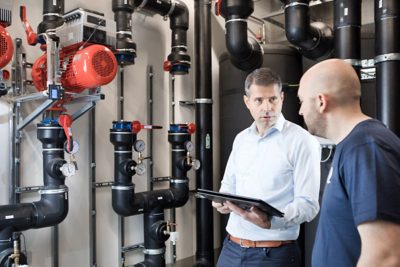Future-proof cooling: Why pre-insulated plastic piping systems improve the sustainability of HVAC applications
GF Piping Systems and Swiss Climate AG have conducted a life-cycle analysis of the factory pre-insulated COOL-FIT 2.0 system. The results, which have now been published in a whitepaper, show that thermoplastic solutions in HVAC applications have a lower carbon footprint than metal while also increasing longevity and efficiency.
Today, buildings account for 40% of total CO2 emissions and of those, about 40% are caused by HVAC applications. In addition, it is estimated that demand for cooling will continue to increase due to factors such as population growth and climate change. To meet global greenhouse gas emissions targets, it is therefore necessary to exploit potential efficiency gains wherever possible. Here, looking at piping systems more closely has proven to be an effective strategy.
Steel pipes are still the most common choice when it comes to HVAC applications. However, thermoplastics such as polyethylene have proven to have a number of benefits. Polyethylene is 60% lighter, faster to install thanks to electrofusion, and corrosion-free. In addition, factory pre-insulation makes the material 30% more energy efficient.
In an effort to quantify the differences in environmental impact between pre-insulated polyethylene and post-insulated steel, Swiss flow solutions provider GF Piping Systems commissioned a comprehensive life-cycle analysis (LCA). Conducted by the independent institute Swiss Climate AG, the study assessed the environmental impact of both solutions in the context of an existing office building. Focusing on the secondary cooling loop, Swiss climate AG compared a proposed metal AC piping system with COOL-FIT 2.0 by GF Piping Systems, which was ultimately selected for the construction project.
Taking the entire 380-meter-long system into account from cradle to grave, Swiss Climate AG came to the conclusion that pre-insulated polyethylene outperforms post-insulated metal in a number of key areas:
- Considering all life cycle phases, the global warming potential of the plastic solution is 4% lower overall.
- The differences are most notable during the production phase where plastic has a 61% lower carbon footprint than metal
- Throughout the service life of the metal alternative, 5% of the steel and 50% of the insulation need to be replaced while the plastic solution has an uninterrupted 25-year service life
Daniel Dossenbach, Head of Global Product Management Cooling at GF Piping Systems, is pleased with the results of the LCA: “We already know that thermoplastic piping solutions in HVAC applications are lighter, more energy efficient, and last longer. Thanks to the study conducted by Swiss Climate AG, we can show that pre-insulated polyethylene pipes also have a lower environmental footprint. As a result, selecting solutions such as COOL-FIT 2.0 can help construction projects qualify for sustainable building certifications while reducing costs and maintenance requirements, or as we would say, create connections for life.”
Access the complete whitepaper with the results of the LCA here.
 Plastic solutions in HVAC applications are not only lighter, more energy efficient, and longer lasting than metal, but also have a lower environmental impact.
Plastic solutions in HVAC applications are not only lighter, more energy efficient, and longer lasting than metal, but also have a lower environmental impact.
- 0
A propos de GF Piping Systems
GF Piping Systems, en tant que fournisseur leader de solutions de tuyauterie pour le transport sûr et durable des fluides, crée des connexions pour la vie "connections for life". GF Piping Systems se concentre sur des systèmes fiables et sans fuite à la pointe de l'industrie pour de nombreux segments de marché exigeants. La priorité donnée à l'orientation client et à l'innovation se reflète dans sa présence mondiale en terme de vente, de service et de production ainsi que dans ses gammes de produits primées comprenant des raccords, des vannes, des tubes, des technologies d'automatisation, de fabrication et d'assemblage.
GF Piping Systems dispose de ses propres sociétés de vente dans 31 pays et est donc toujours aux côtés de ses clients. Les sites de production répartis sur 36 sites en Amérique, en Europe et en Asie assurent une disponibilité suffisante et une livraison rapide et fiable. En 2022, GF Piping Systems a réalisé un chiffre d'affaires de 2'180 millions de francs suisses et employait 8'085 personnes. GF Piping Systems est une division de Georg Fischer AG, fondée en 1802 et dont le siège social se trouve à Schaffhausen, en Suisse.
www.gfps.com
